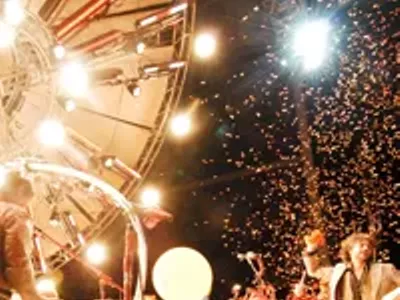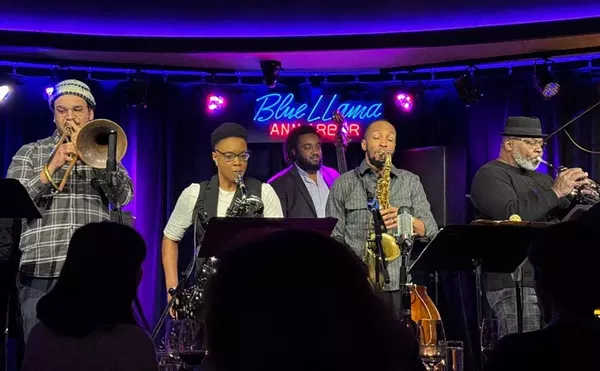Way back in the late '70s, as punk was melding into new wave, the girl-group aesthetic became a staple in a lot of bands' sounds, including but not limited to Josie Cotton, Blondie, the Go-Go's, Blue Angel (fronted by a then-unknown Cyndi Lauper) — even the Ramones themselves.
The Pipettes, a trio of fetching, fascinating Brits, are a "modern" version of that same aesthetic, injecting gorgeous catchiness back into pop music and putting stylish dance steps back on the stage. Fired by the infectious sounds of female doo-wop pioneers the Chantels, street-savvy vixens the Ronettes and '80s chart-busters Bananarama, the Pipettes' matching polka dots and sunny, engaging dispositions stand in direct opposition to the prevalent mood of ironic, detached indie rock drone.
Formed in Brighton, England, in 2003, their goal now is the same as it was then: to write the perfect pop song.
"We all like different kinds of music," says Becki Pipette of her compatriots Rosay and Gwenno and their backing band, the Cassettes. "But what we do all share is the love of a really finely crafted song. So although we appreciate and respect each other's tastes — which makes it a lot easier to share a creative passion for making music — this notion of the perfect pop song is something we crave, something we're very ambitious about. We always want to write one better than the last one we've written."
Perhaps that's why the seamless 16-track We Are the Pipettes (Interscope) — which features their dance floor killer, "Pull Shapes" — sounds more like a compilation of classic singles than a debut album.
They're as refreshingly irreverent as they are talented, and their interviews are as entertaining as their music. Hoping to direct a little equal time to some of their own idols, the Pipettes once questioned the crushing influence of the Beatles, suggesting that the Fab Four might be just a tad bit overrated. They stirred up a hornet's nest in the process, Becki concedes, but they're standing their ground.
"With the Beatles, I don't think a band had ever had that kind of success before. So it really did pave the way for other bands like that to have global success and start dominating the way that mainstream music existed. Which, considering that our passion is pre-Beatles music — it's really '57 to '63, all those girl groups that existed just before soul and Motown became really mainstream as well — it just kind of overshadowed that."
This is an interesting concept, since the Beatles were influenced by many of the same artists that influenced the Pipettes, including the "girl groups." The Beatles not only frequently stated their love of those groups but even covered tracks like "Baby, It's You," "Boys" and "Please Mr. Postman," among others. They revered the sound so much, in fact, that they later hired "girl group" architect Phil Spector to salvage Let It Be, and Lennon and Harrison used the producer on numerous solo projects. Still, despite their admiration for the form, the Fab Four's dominance of pop overshadowed this fact in the minds of the mainstream public.
"I think that's a real shame because a lot of people do genuinely believe that pop music started with the Beatles. And that's sad. That's why we believe that the Beatles ruined everything; it's not because we hate them or we necessarily hate their music, it's because their success standardized stuff and made people forget the great pop music that had been written before they came along."
"You know," she continues, "we're not saying that this kind of music is the best music made, but, hey, what if this music would have gone globally mainstream? Then how would things have changed? Would we be getting our Arctic Monkeys and our Libertines now? I think that's an interesting thing to think about."
In classic pop fashion, a Pipettes show is an all-ages, all-inclusive affair. "Pop music is about being open to as many different kinds of people as possible — race, creed, age, gender and sexuality shouldn't matter; it should be able to cross all of those kinds of social constructs and evolutionary designs. A lot of our gigs have kind of become family outings as well, which is really lovely: You get the parents bringing along the kids. I like the innocence of that because the Pipettes are about remembering the innocence of music. Not looking at it as a naive thing, but just trying to bring some of the romance back.
"It's very much about the whole notion of getting dressed up and going out for the night and having a really good time. And it's really nice when people come to our gigs and say, 'We've just formed a girl band as well.' Wicked! Do it! We're not that specific — it's not just about women — but I think that kind of idea, if music empowers you in that way, is such a brilliant thing."
Doors at 8 p.m. on Wed., Oct. 3, at the Magic Stick, 4120 Woodward Ave., Detroit; 313-833-9700; $12; all-ages.
Send comments to [email protected]





